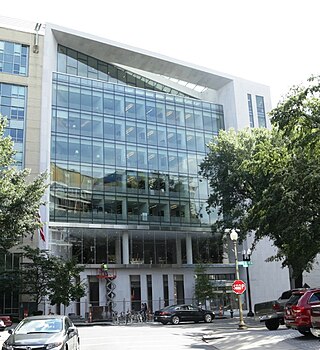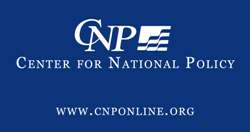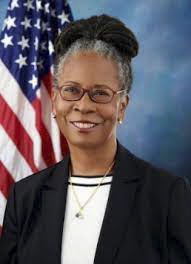
A think tank, or policy institute, is a research institute that performs research and advocacy concerning topics such as social policy, political strategy, economics, military, technology, and culture. Most think tanks are non-governmental organizations, but some are semi-autonomous agencies within government, and some are associated with particular political parties, businesses or the military. Think tanks are often funded by individual donations, with many also accepting government grants.

The Center for Strategic and International Studies (CSIS) is an American think tank based in Washington, D.C. From its founding in 1962 until 1987, it was an affiliate of Georgetown University, initially named the Center for Strategic and International Studies of Georgetown University. The center conducts policy studies and strategic analyses of political, economic and security issues throughout the world, with a focus on issues concerning international relations, trade, technology, finance, energy and geostrategy.

Stephen John Hadley is an American attorney and senior government official who served as the 20th United States National Security Advisor from 2005 to 2009. He served under President George W. Bush during the second term of his administration. Hadley was Deputy National Security Advisor during Bush's first term.
The Washington Institute for Near East Policy is a pro-Israel American think tank based in Washington, D.C., focused on the foreign policy of the United States in the Near East.

The International Food Policy Research Institute (IFPRI) is an international agricultural research center founded in 1975 to improve the understanding of national agricultural and food policies to promote the adoption of innovations in agricultural technology. Additionally, IFPRI was meant to shed more light on the role of agricultural and rural development in the broader development pathway of a country. The mission of IFPRI is to provide research-based policy solutions that sustainably reduce poverty and end hunger and malnutrition.

Andrew Jackson Goodpaster was an American Army General. He served as NATO's Supreme Allied Commander, Europe (SACEUR), from July 1, 1969, and Commander in Chief of the United States European Command (CINCEUR) from May 5, 1969, until his retirement December 17, 1974. As such, he was the commander of all NATO (SACEUR) and United States (CINCEUR) military forces stationed in Europe and the surrounding regions.
Loch K. Johnson is Regents Professor of Political Science at the University of Georgia. He is editor of the journal Intelligence and National Security and has written numerous books on American foreign policy. Johnson was special assistant to the chair of the Senate Select Committee House Subcommittee on Intelligence from 1975 to 1976. He also served as staff director of the House Subcommittee on Intelligence Oversight from 1977 to 1979. In 1995 and 1996, Johnson worked with the chair of the Aspin-Brown Commission on Intelligence.

The Truman Center for National Policy (CNP) is an American non-profit public policy think tank headquartered in Washington, D.C.

The Elliott School of International Affairs is the professional school of international relations, foreign policy, and international development of the George Washington University, in Washington, D.C. It is highly ranked in international affairs and is the largest school of international relations in the United States.

The McCourt School of Public Policy is one of ten constituent schools of Georgetown University. The McCourt School offers master's degrees in public policy, international development policy, policy management, data science for public policy, and policy leadership as well as administers several professional certificate programs and houses fifteen affiliated research centers. The McCourt School has twenty-one full-time faculty members, ten visiting faculty members, more than one-hundred adjunct faculty members and approximately 450 enrolled students across the various degree and executive education programs.

The Schar School of Policy and Government - SSPG, is the public policy school of George Mason University, a public research university in the Commonwealth of Virginia near Washington, D.C. Established as Northern Virginia's first public policy school with locations in Arlington and Fairfax County, the school's political science curriculum has a professional education and applied emphasis on public administration and national security at both the undergraduate and graduate levels, in addition to a traditional liberal arts education, while also maintaining an active role within all five major subfields of political science known as political philosophy, political methodology, comparative politics, international relations, public policy and public administration.
The Environmental and Energy Study Institute(EESI) is an independent, bi-partisan 501(c)(3) non-profit organization that aims to promote environmentally sustainable societies. Based out of Washington, DC, EESI seeks to be a catalyst moving society away from environmentally damaging fossil fuels and toward a clean energy future. The organization was established in 1984 by a bipartisan and bicameral group of members of the United States Congress who were concerned with global environmental and energy problems.

The Ford Institute for Human Security was established in 2003, and is an independent research institute located within the University of Pittsburgh. The researchers at the institute primarily investigate issues relating to human rights, including: genocide, forced labor, corporate responsibility, international conflicts, forced migration, refugees, and environmental security. The institute generates and disseminates policy papers and advances nonpartisan policy proposals. Research produced by the Ford Institute is available to national and international policy makers, non-governmental organizations, corporations and any interested organizations. Each year the institute hosts several conferences, speakers, and workshops on issues related to human security. The Ford Institute was created with a large endowment from Ford Motor Company, and is currently under the direction of Dr. Müge Kökten Finkel, associate professor at the Graduate School of Public & International Affairs (GSPIA). The Ford Institute was previously directed by professors Simon F. Reich, who founded the institute in 2003, Paul J. Nelson, and Taylor B. Seybolt.
Teresa Ghilarducci is an American scholar on labor and retirement issues. She has advocated for government to extend occupational retirement plan coverage to all workers. She published Rescuing Retirement in 2018; the book makes the case for a Guaranteed Retirement Account that would supplement Social Security. In 2016 she wrote a popular book, How to Retire with Enough Money: And How to Know What Enough Is. One of her most recent books, When I’m Sixty Four: The Plot Against Pensions and the Plan to Save Them, investigates the loss of pensions on older Americans and proposes a comprehensive system of reform. Her previous books include Labor's Capital: The Economics and Politics of Employer Pensions, winner of an Association of American Publishers award in 1992, and Portable Pension Plans for Casual Labor Markets, published in 1995. Ghilarducci is an executive board member of the Economic Policy Institute, a member of the Retirement Security Advisory Board for the Government Accountability Office, court appointed trustees for the retiree health care trusts for UAW retirees of GM, Ford, and Chrysler and the USW retirees of Goodyear Tire. Ghilarducci won an Association of American Publishers award for her book Labor's Capital: The Economics and Politics of Employer Pensions in 1992. She previously taught economics for 25 years at the University of Notre Dame.
Kenneth E. deGraffenreid retired in 2012 from his position as Professor of Intelligence Studies at The Institute of World Politics, where he taught since the graduate school's first summer session in 1992. He is now a professor emeritus at the IWP. Numerous published sources indicate that deGraffenreid has been involved in the highest echelons of the United States Intelligence Community: a 2004 article in The New Yorker mentioned that he was responsible for all Department of Defense "Special Access Programs" (SAPs). He is recognized as a leading authority in intelligence, foreign propaganda, information warfare, and counterintelligence. He was an early pioneer in the academic sub-discipline of intelligence studies which was in its nascency when he began teaching in 1992.

The Bush School of Government and Public Service is an undergraduate and graduate college of Texas A&M University founded in 1997 under former US President George H. W. Bush's philosophy that "public service is a noble calling." Since then, the Bush School has continued to reflect that notion in curriculum, research, and student experience and has become a leading international affairs, political science, and public affairs institution.

Yung-Ping Chen was an American economist and gerontologist of Chinese origin. He pioneered the concept of home equity conversion in the United States and developed innovative approaches to the funding of Social Security benefits and long-term care. His scholarship contributed to a better understanding of the economic, political, and social implications and challenges created by the "mass aging" phenomenon—the ongoing and unprecedented shift to an increasingly elder-populated society.

Mary Colleen Daly is an American economist, who became the 13th President and chief executive officer of the Federal Reserve Bank of San Francisco on October 1, 2018. She serves on the Federal Reserve's rate-setting Federal Open Market Committee on a rotating basis. Previously, Daly was the Executive Vice President and Director of Research of the Federal Reserve Bank of San Francisco, which she joined as an economist in 1996.

Kilolo Kijakazi is an American academic who served as acting commissioner of the Social Security Administration from 2021 to 2023. She was previously appointed deputy commissioner for retirement and disability policy in January 2021, before taking on the top position following Andrew Saul's dismissal on July 9, 2021.












